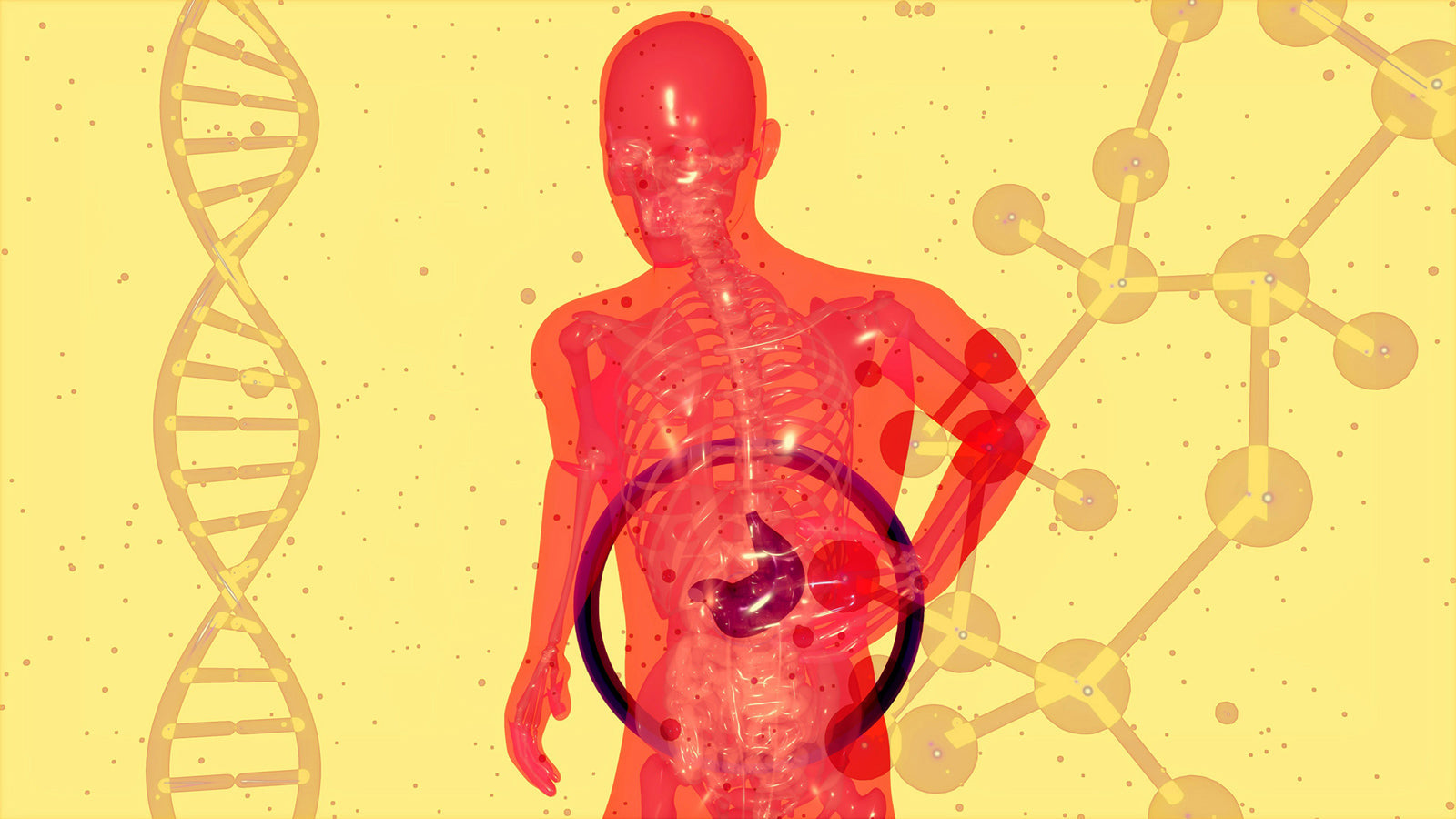Have you ever wondered what happens to that delicious meal after you take your last bite? Your digestive system performs an incredible feat every single day, breaking down complex foods into tiny nutrients your body can absorb. At the heart of this amazing process are digestive enzymes – specialized proteins that act like molecular scissors, cutting your food into smaller pieces.
Think of digestive enzymes as your body's personal food processors. Understanding how these helpers work can help you make informed decisions about your digestive health and overall wellness.
This article is for educational purposes only and is not intended to diagnose, treat, cure, or prevent any disease. Always consult with your healthcare provider before starting any new supplement regimen.
The Science Behind Digestive Enzymes
Digestive enzymes are biological catalysts that speed up the chemical reactions needed to break down food. Your body produces these proteins naturally, primarily in your pancreas, stomach, and small intestine. Each enzyme has a specific job, like a specialized tool in a craftsman's workshop.
When you eat, your digestive system releases different enzymes depending on what's on your plate. These enzymes work together in a carefully orchestrated process, each one targeting specific types of nutrients. The process begins the moment food enters your mouth and continues throughout your digestive tract.
Your pancreas plays a major role in enzyme production, releasing digestive enzymes into your small intestine when food arrives. This process happens automatically as part of your body's normal digestive function.
The Three Main Types of Digestive Enzymes
Understanding the different types of digestive enzymes helps explain their role in normal digestion. There are three primary categories, each with its own function.
Proteases work on proteins. These enzymes help break down proteins from sources like meat, fish, eggs, and beans into individual amino acids during normal digestion. Your body then uses these amino acids for various functions including building and maintaining tissues.
Lipases work on fats and oils. They help break down dietary fats into fatty acids and glycerol as part of normal digestion. This process is important for the absorption of fat-soluble vitamins (A, D, E, and K).
Amylases work on carbohydrates. They help break down starches and complex carbohydrates into simple sugars during normal digestion. Amylases are present in saliva, which is why chewing your food thoroughly supports the natural digestive process.
Understanding Digestive Enzyme Function
Your body usually produces digestive enzymes as part of normal function, but several factors can influence this natural process. Age is one factor – enzyme production may naturally change as we get older, which is a normal part of aging.
Some people may experience occasional digestive discomfort after eating certain foods. This might include temporary bloating, gas, or feelings of fullness. These occasional experiences are common and may be related to various factors including eating habits, food choices, or individual differences in digestion.
Certain health conditions can affect enzyme production. If you have ongoing digestive concerns, it's important to discuss them with your healthcare provider to determine the underlying cause and appropriate approach.
Supporting Your Natural Digestive Process
There are several lifestyle approaches that may support your body's natural digestive processes. Your eating habits and lifestyle choices can play a role in how comfortable you feel after meals.
Chewing your food thoroughly is one simple approach that supports natural digestion. When you chew properly, you're mechanically breaking down food and mixing it with saliva, which contains enzymes. Taking time to chew each bite thoroughly may support the natural digestive process.
Including certain foods in your diet may provide naturally occurring enzymes. Pineapple contains bromelain, and papaya contains papain – both are naturally occurring enzymes. Other foods like mangoes, kiwis, and fermented foods also contain various enzymes naturally.
Managing stress may support overall digestive comfort. When you're stressed, it can affect various bodily functions, including digestion. Eating in a relaxed environment and avoiding eating when upset or rushed may contribute to digestive comfort.
Staying adequately hydrated supports normal bodily functions, including digestion. However, some people find that drinking large amounts of water with meals affects their comfort, so you may want to experiment with timing your fluid intake.
Understanding Digestive Enzyme Supplements
Digestive enzyme supplements are dietary supplements that contain enzymes similar to those your body produces naturally. These supplements are intended to support normal digestion as part of a healthy lifestyle.*
Quality digestive enzyme supplements typically contain a blend of proteases, lipases, and amylases, often along with additional enzymes. Some formulas include lactase, cellulase, or alpha-galactosidase. These supplements are intended to be taken with meals as directed on the product label.
The timing of enzyme supplementation matters for optimal effectiveness. Most digestive enzyme supplements are designed to be taken with meals, allowing them to work alongside your body's natural digestive processes. Always follow the directions on the product label for best results.
It's generally recommended to start with the suggested serving size and adjust as needed based on your individual response. Everyone's needs are different, so what works for one person may not be the same for another.
Choosing Quality Digestive Enzyme Supplements
When selecting a digestive enzyme supplement, quality and transparency are important considerations. Look for products from reputable manufacturers who provide clear information about their ingredients and manufacturing processes.
Consider your individual needs when choosing enzymes. Different formulations may emphasize different types of enzymes. For general digestive support, a balanced formula with multiple enzyme types is commonly chosen.
Quality manufacturing practices are important for enzyme supplements. Look for products from companies that follow good manufacturing practices and may use third-party testing. Enzymes are delicate proteins that require proper handling and storage to maintain their activity.
Some enzyme formulations may include additional ingredients designed to support the enzymes' activity in different pH environments throughout the digestive tract. Advanced formulas may include special coatings or other technologies.
Important Considerations and Safety
While digestive enzyme supplements are generally well-tolerated by most people, it's important to use them appropriately. Always read and follow the label directions, and consult with your healthcare provider before starting any new supplement, especially if you have existing health conditions or take medications.
Some people may experience mild, temporary digestive changes when first starting enzyme supplements. These typically resolve as your body adjusts. If you experience any persistent or concerning symptoms, discontinue use and consult your healthcare provider.
Digestive enzyme supplements are not intended to replace a healthy diet or medical treatment. They should be used as part of an overall approach to digestive wellness that includes healthy eating habits and lifestyle choices.
If you have known food allergies or sensitivities, check supplement labels carefully for potential allergens. Some enzyme supplements may be derived from sources that could trigger allergic reactions in sensitive individuals.
The Role of Diet and Lifestyle
Supporting your digestive health involves more than just supplements. A balanced diet with adequate fiber, regular meal timing, portion control, and mindful eating practices all contribute to digestive comfort.
Regular physical activity may support overall digestive health as part of a healthy lifestyle. Many people find that gentle movement after meals, such as a short walk, contributes to their overall comfort.
Getting adequate sleep and managing stress through healthy coping strategies may also support overall wellness, including digestive comfort. These lifestyle factors work together to support your body's natural functions.
Making Informed Decisions
When considering digestive enzyme supplements, it's helpful to understand your individual needs and goals. Keep a food diary to identify patterns in your digestive comfort, and discuss your observations with your healthcare provider.
Your healthcare provider can help determine whether digestive enzyme supplements might be appropriate for your individual situation. They can also help identify any underlying conditions that might be contributing to digestive discomfort.
Remember that supplements work best as part of an overall healthy lifestyle. Combining appropriate supplementation with healthy eating habits, regular physical activity, stress management, and adequate sleep provides the most comprehensive approach to digestive wellness.
Conclusion
Digestive enzymes play an important role in your body's natural ability to break down and absorb nutrients from food. Understanding how these enzymes work can help you make informed decisions about supporting your digestive health.
Whether you choose to focus on lifestyle approaches, consider supplementation, or combine both strategies, the key is to work with your healthcare provider to develop an approach that's right for your individual needs.
Taking a proactive approach to digestive health through informed choices about diet, lifestyle, and appropriate supplementation can contribute to your overall wellness goals. Remember that everyone's digestive system is unique, so what works best for you may be different from what works for others.
*These statements have not been evaluated by the Food and Drug Administration. This product is not intended to diagnose, treat, cure, or prevent any disease.


